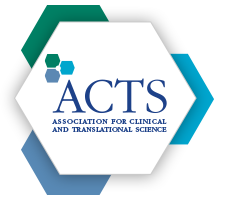NIH Announces Fast-Track Funding Opportunity for Pain Management Comparative Effectiveness Clinical Trials
The CCTS encourages investigators throughout our Partner Network to consider applying to a new Helping to End Addiction Long-term (HEAL) FOA, RFA-NS-19-021, which will fund well-controlled trials in specific pain conditions to evaluate preventive strategies or interventions. The goal? To provide clinicians with information about the effectiveness of treatments or management strategies that reduce opioid use and pain associated with many types of diseases or conditions. This fast-track opportunity will be gone in 46 days--applications are due Friday, Feb. 1, 2019. All applicants must include a letter of support from the CCTS (contact This email address is being protected from spambots. You need JavaScript enabled to view it. ). A webinar from 11am-1pm CT TODAY, December 17th, will provide more information to potential applicants.
Why Attend TS19?
The premiere translational science meeting of the year will take place in Washington, DC, March 5-8, 2019, providing valuable learning and networking opportunities for researchers of all skill sets and experience levels across the spectrum of clinical and translational science. Mark your calendar to join more than 1,100 colleagues, including researchers, trainees, and federal program officers, and soak up the latest breaking research, funding, and collaboration news at TS19. We offer a Top Ten list of compelling reasons to register for TS19 today.
CCTS External Advisory Committee Tees Off Strategic Planning for 2019
The annual CCTS External Advisory Committee (EAC) meeting, which took place on Monday, December 10, 2018, teed off the night before at Top Golf, where EAC members and CCTS faculty and staff enjoyed an informal evening before getting down to business at the Hub. CCTS thanks our EAC members, UAB leadership, CCTS Partner Network site leads, CCTS team leads and staff, and our NCATS program officer for their support in making the meeting a success.
Abstract Deadline Extended for Second Conference on Bioethics in Minority Health and Health Disparities Research
"Effective Health Care and Inclusion: Growing the Next Generation of Researchers for Bioethics, Biomedical, Behavioral, and Health Disparities Research," cohosted by Morehouse School of Medicine, Tuskegee University, and the UAB Comprehensive Cancer Center, will take place in Opelika, AL, from Wednesday, Jan. 23 to Friday, Jan. 25, 2019. The deadline for poster and oral presentation abstracts is now Friday, December 28, 2018.
Start Off the New Year with a CCTS Mentoring Training
The CCTS Case Studies in Mentoring series, an eight-week program offered several times a year, starts anew in January. Earn a certificate by attending all sessions—Partners are encouraged to attend via Zoom. CCTS has also relaunched our First Friday Mentoring Lunch (FFML), which provides a more informal opportunity to share tips for navigating mentor-mentee relationships—register soon for our next FFML on Friday, January 4. Planning to publish in 2019? Join us for our January Forum on Wednesday, January 9, when Editors-in-Chief of several leading academic journals provide mentorship in the form of sharing best practices for mastering the peer review process.
Resolve to Use i2b2 to Access Clinical Data for Research in 2019
If you have not yet taken "Accessing Clinical Data for Research with i2b2," our hands-on training for investigators to explore the i2b2 database for accessing de-identified patient data, checking study feasibility, developing hypotheses, and more, you are in luck. Several new dates through April 2019 have been announced. Registration is required. Supervisory approval is required for non-faculty (e.g., trainees, staff). All attendees are strongly encouraged to request i2b2 access prior to their session. Already trained on i2b2? Download our new i2b2 flyer and share with interested colleagues.
REACT Center Announces Pilot Funding Opportunities for Rehabilitation and Regenerative Medicine Research—CCTS Partners Eligible to Apply
The NIH-funded Rehabilitation Research Resource to Enhance Clinical Trials (REACT) center, based at the CCTS Hub, has released an RFA for pilot funding to support the conduct of innovative, early stage, proof-of-concept studies focused on medical rehabilitation for either chronic or acute conditions (e.g., muscle, bone, or joint diseases; neurodegenerative or neurodevelopmental diseases; traumatic injury; stroke; cancer; aging/frailty; or post-surgical rehabilitation). A complementary pilot RFA, cosponsored by REACT and the Alliance for Regenerative Research and Training (AR3T), focuses on integration of principles and approaches from rehabilitation and regenerative medicine. Letters of Intent for both pilots are due Wednesday, December 19.
Peer Review Got You Down? January Forum Will Feature Latest Advice from Biomedical Journal Editors
If one of your 2019 resolutions is to see your research make it into a leading biomedical journal, mark your calendar for our first CCTS Forum of the year on Wednesday, Jan. 9. Joined by a multidisciplinary panel of Editors-in-Chief, CCTS will explore best practices and what aspiring authors need to consider as they prepare articles for peer review. With rejection rates as high as 90% among certain high-impact journals and major changes on the horizon to address data sharing and reproducibility, even well-established science writers will benefit from this discussion. CCTS Director of Genomic Medicine, UAB Chief Genomic Officer, and Editor-in-Chief, American Journal of Human Genetics, Bruce Korf, MD, PhD, will present and moderate.
CCTS Co-Director Spotlights Informatics Advances at Annual Meeting
UAB Informatics Institute Director and CCTS Co-Director James J. Cimino, MD, summarized the key developments in biomedical informatics as described in 106 nominated papers at the 2018 American Medical Informatics Association meeting in San Francisco. From tools to improve the quality of care for patients and reduce burnout for clinicians to techniques that extract knowledge from noise in Big Biological Data sets, the field of informatics is revolutionizing the information infrastructures that support the full spectrum of health-related research and practice. Now that's translation in action!
Featured Community Partner: Community Food Bank of Central Alabama
Food insecurity impacts health in several ways, including higher risk of obesity, diabetes, and other chronic diseases. In Alabama, more than 19% of the population (~919,670 people) are food insecure, ranking it 2nd highest in the nation for food hardship. Kathryn Strickland, Executive Director of the Community Food Bank of Central Alabama, offered hope when she spoke at our November One Great Community meeting (view her slide deck). She described how a small food pantry in the UAB NICU blossomed into an initiative (RX Health) that helps train health care providers on how to screen patients for food insecurity. Several UAB health clinics (geriatrics, diabetes, heart failure, and family medicine) not only screen now, but also offer referrals to the Food Bank Benefits Enrollment Center, where they can sign up for SNAP (food stamps). Partnerships with Medicaid, UAB Blazer Kitchen, and the UAB Benevolent Fund are also extending the reach and impact of the Food Bank. Learn more about how you can help end hunger across our region.
Submit an Abstract to the Second Conference on Bioethics in Minority Health and Health Disparities Research
"Effective Health Care and Inclusion: Growing the Next Generation of Researchers for Bioethics, Biomedical, Behavioral, and Health Disparities Research," cohosted by Morehouse School of Medicine, Tuskegee University, and the UAB Comprehensive Cancer Center, will take place in Opelika, AL, from Wednesday, Jan. 23 to Friday, Jan. 25, 2019. Poster and oral presentation abstracts are due by Friday, December 7, 2018.









